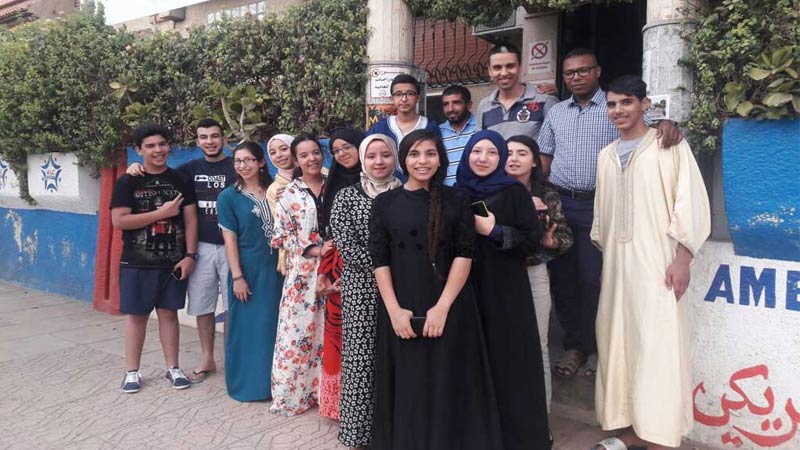How Much Do English Teachers Make in Morocco?
Explore how much money you can make teaching English in Morocco and the expenses you will need to consider both in terms of start-up costs and your monthly cost of living.
Written By: John Bentley | Updated: June 29, 2023
Written By: John Bentley
Updated: June 29, 2023

Located just in the northwestern corner of North Africa, Morocco is one of the continent's top job markets for teaching English. The draws of living and teaching in Morocco are endless. With scenic coastlines along both the Atlantic and the Mediterranean and the stunning beauty of the Atlas Mountains and the Sahara Desert, Morocco is a wonderland for those who love outdoor recreation. It is also home to the ancient civilization of the Berbers and has been a center of Arabic and Islamic culture for 1400 years. In addition, its cities like Fez, Rabat, Casablanca, and Marrakesh are renowned for their architecture (both historic & modern), colorful markets, and some of the best cuisine in the world.
Enticing, right? But how much money can you make teaching English in Morocco? Let's find out!
English Teacher in Morocco Salary
How Much Does an English Teacher Earn in Morocco?
On average, English teachers in Morocco can expect to make anywhere between $500 - $1,000 USD (approx. 7,200 - 10,400 MAD*) per month with the option to earn additional income through private tutoring ($10-20 USD per hour) and teaching English online ($5-$20 USD per hour).
Your salary will fluctuate depending on which teaching position you choose to pursue and how many hours you teach per week. Any previous teaching experience can possibly translate into higher starting pay rates and as you gain experience (and good performance and customer reviews), you will likely see your salary rise accordingly.
* The abbreviation for the Moroccan dirham is MAD.
Read more: How Much Can I Make Teaching English Abroad?
Morocco Teaching Salary: The Details
There are several different teaching opportunities available for TEFL-certified teachers in Morocco. ESL (English as a second language) teachers who ultimately spend time teaching English in Morocco do so via one of the following avenues:
- Teaching business professionals in English language schools
- Private tutoring for both children and adults
- Teach English online
- A combination of the above.
NOTE: If you possess more advanced teaching credentials, you may be able to gain employment teaching English in an international school or a private bilingual grade school or high school. These schools often offer higher salaries and more benefits than the positions that typical first-time teachers will take.
| Salary & Expenses | English Teacher Salary in Morocco Details |
|---|---|
| Language School Salary | Between $500 and $1,000 USD per month |
| Private Tutoring Salary | $5-$15 USD per hour |
| Teach English Online Salary | $5-$20 USD per hour |
| Average Cost of Living | $500-1,000 USD per month |
| Start-up Costs | Between $1,000 and $1,500 USD |
Let's explore each option and what you can expect to earn from them:
1. Morocco Language School Salaries
There is a great demand for English teachers in and around major cities like Fez, Rabat, Casablanca, Tangiers, and Marrakesh. The school year in Morocco typically runs from September through June or July. However, private language institutes that cater primarily to adults in the business community do not necessarily operate according to the academic calendar used by grade schools and universities.
Most ESL teachers will find their first employment in a language institute once they are on the ground in Morocco. However, some schools will interview in advance over a video call.
Americans may also find employment opportunities teaching English in American Language Centers, which are operated by the U.S. State Department in major cities throughout the country. Salaries are similar to those paid by top-level language schools.
Pay will fluctuate depending on where you are located, with teachers in larger cities earning more than those teaching in smaller cities and towns. English teachers working at language schools in Morocco can expect to make anywhere between $500 - $1,000 USD per month.
Visa Options for Teaching English in Morocco
Work Visa for Teaching English in Morocco
Most foreign English teachers in Morocco will arrive in the country on a 90-day tourist visa, and then interview for positions locally. Once you gain employment, you will transition to a work permit.
If you find a job in advance of being in Morocco your work permit should be processed before moving to Morocco. Your employer should provide you with the necessary guidance and relevant documents to assist you with this process.
However, if you are already in Morocco - which is typical since most schools recruit and interview locally - you should be able to apply for a work permit with the help of your school. This is typically completed in Rabat, even if you are teaching outside of the city. You will need your college diploma, work contract, criminal background check, and TEFL Certificate to obtain a work permit. Consult with your school on any other documents you may need. The Department of labor will not issue work permits to teachers over the age of 60. You can read more about work permits for Morocco on the Department of Labor’s website.

2. Morocco Private English Tutoring Salaries
Private tutoring ESL students (especially adults) is extremely common among English teachers in Morocco. Teachers that choose this route are often:
- Teaching English in Morocco at a language school and taking on some private tutoring students to help supplement their income;
- Teaching English online and seeking supplemental income by privately tutoring students in addition to their online teaching job;
- Solely providing private-tutoring lessons as their only form of income.
Getting clients for private lessons is a marketing exercise, and all the avenues that seem appropriate to your circumstances have to be explored. Here are some ways you can market yourself:
- Post notices in schools and universities, coffee shops, supermarkets, embassies, or corner shops;
- Run an advertisement in local periodicals, especially those that cater to university students, professionals and ex-pats;
- Send notices to local public schools announcing your willingness to work with local students on their English.
- Compile a list of addresses of professionals (lawyers, architects, etc.), and professional associations who may need English for their work and have the resources to pay for it and then contact them.
- Call on export businesses, distribution companies, and even travel agencies and tourism companies.
- Get ESL business cards made with Arabic on one side and English on the other.
- Enroll in ITA's English Tutoring Specialty Course. This course will not only provide you with enhanced teaching skills in a private tutoring setting, but also incorporates practical guidelines for how to set up your own tutoring business.
How much money can I make from private tutoring ESL students in Morocco?
As a first-time private ESL tutor in Morocco, you should expect to charge and make around $7-15 USD per hour for one-on-one lessons (depending on where in Morocco you are based). If you are providing private tutoring lessons for small groups (2-3 students at a time), it's possible to increase your rates as your small group of students will be splitting the hourly cost amongst themselves. Also, if you are able to market yourself to economic elites and ex-pats - especially those who work at embassies or multinational corporations, you can very likely charge higher rates and make the equivalent of $20+ an hour. These types of clients are typically easier to cultivate once you have a little experience under your belt and some reviews as well.
Something to keep in mind - a student may only be after a single private tutoring lesson, or a handful, and can withdraw from their lessons with you at any time. As a result, you should be cautious when trying to budget your private tutoring income too far into the future.
3. Morocco Teaching English Online Salaries
Like private ESL tutoring, teaching English online is an extremely popular way for teachers to make money. Some English teachers in Morocco teach online as their sole job and income, while others do it to supplement the income they earn from teaching at a language school or from private tutoring.
Teaching English online provides TEFL-certified teachers with the opportunity to make money from the comfort of their own homes, with most teachers being able to make anywhere from $5-$20 USD per hour. Hours are flexible, and it is up to you how much or how little you teach - you are in total control of your schedule. Also, remember that the cost of living is lower in Morocco, so every $5-$20 that you earn will have a lot more purchasing power and go will go further than it does in the U.S. or Europe.
A key advantage of teaching online is that you can begin teaching and making money before you move to Morocco. This is a great way to help cover the start-up costs of your move and will ensure that you have an income immediately upon your arrival in Morocco.
Additional Reading: To learn more about how much you can earn from online ESL teaching, please read How Much Money Can I Make Teaching English Online? Need help to find an online teaching platform? Check out Non-Chinese ESL Companies to Teach English Online With.

Expenses for Teaching English in Morocco
There are two categories of expenses that need to be taken into consideration for those looking to teach English in Morocco:
- Start-up costs
- Cost of living
Let's explore each of the two in more detail.
1. Start-Up Costs for Teaching English in Morocco
Start-up costs are expenses you will incur from your arrival in Morocco until you receive your first paycheck and may include things like a security deposit and first month's rent, apartment supplies, transport, groceries, getting your new local cell phone number set up, etc.
Start-up costs to cover your first month of living in Morocco will usually range somewhere between $1,500 and $2,000 USD, but having access to $2000 - $3000 would be ideal. This is the minimum amount of savings you should have on hand before leaving home and arriving in Morocco. If you have more, great, but if you have less, you may be setting yourself up for failure from the get-go which can cause unnecessary added stress during an already stressful period of adaption and change.
When planning ahead, it's important to remember that there are other start-up costs to consider before embarking on your teaching adventure in Morocco. These will include the cost of your TEFL certification, airfare to Morocco, and any costs associated with obtaining necessary documents like your passport and a criminal background check.
2. Cost of Living for Teaching English in Morocco
Cost of living refers to everyday monthly expenses you will incur during your time in Morocco. The cost of living in Morocco is relatively low ($500 - $1000 a month) and salaries ($500 - $1000 a month) for first-time ESL teachers are modest. English teachers typically live comfortably on what they earn, but financial planning is still imperative to prepare you for success. The most popular expenses that fall under this category include:
- Monthly rent expenses
- Utilities (electricity, gas, water bills, etc)
- Food and grocery expenses
- Health insurance
- Internet bill
- Cell phone bill
- Transportation (transit card, ride-sharing services, etc)
- Travel/entertainment expenses
Your cost of living expenses can vary drastically based on where in Morocco you are based. For example, those living in larger cities like Santiago can expect to have a higher cost of living compared to those located in smaller cities or towns. As a general rule of thumb, you should budget $500 - $1,000 USD per month to cover your cost of living.
Morocco is very much a break-even country, meaning you can cover your rent and bills, support yourself, live comfortably, and enjoy your life abroad to the fullest, but you shouldn't expect to save money at the end of each month. If you are hustling and taking on private tutoring lessons and/or teaching English online in addition to your regular teaching schedule, you may increase your ability to save and come out on top at the end of each month.
Go further: Requirements for teaching English in Morocco
Posted In: Teach English in Morocco, Teach English in Middle East, Teach English in Morocco Must Read
John Bentley
Co-Founder at International TEFL Academy
John Bentley is Co-Founder & Senior Writer for International TEFL Academy (ITA), the world leader in TEFL certification for teaching English abroad. A graduate of Harvard University and the Medill School of Journalism at Northwestern, John is a recognized expert in the field of TEFL. His articles have appeared across the field's top websites, including GoAbroad.com, StudyAbroad.com, InterExchange, GoOverseas.com, Adventure Teaching, & many others. He has also spoken as an expert on Teaching English Abroad & TEFL certification at major conferences like MeetPlanGo and Lessons from Abroad (LFA) in Portland & San Diego.
Want to Learn More About Teaching English Abroad & Online?
Request a free brochure or call 773-634-9900 to speak with an expert advisor about all aspects of TEFL certification and teaching English abroad or online, including the hiring process, salaries, visas, TEFL class options, job placement assistance and more.
"The Middle East is a very fascinating and unfortunately an extremely misunderstood area by so many. In a lot of ways, it’s an extremely easy place to adjust to, Western luxuries are quite accessible and almost everything is in English and Arabic."

- Katie Ayers
Teaches English in the UAE






